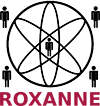Ethically developed technologies for safer societies – The ROXANNE project case study
ROXANNE is a security project funded under the European Union Horizon 2020 innovation programme.
ROXANNE brings together research institutions, law enforcement agencies and industry to build tools to assist law enforcement in tackling organised crime and terrorist groups.
Surveillance of these organised crime and terrorist groups takes a significant amount of time for investigators to deal with. For example, listening to many hours of intercepted phone calls in order to identify a suspect. In large investigations where group members might need to be identified and linked together, this can take many weeks.
The ROXANNE project intends to speed up these processes through producing a platform that extracts data from text, speech, images, and video data in order to enhance suspect identification and, through analysing the connections in these data, map out the communication links between suspects in criminal networks. It aims to save up to 30% of investigation time and 40% of personnel costs, compared to law enforcement officers carrying out these tasks themselves.
The innovations funded under the Horizon 2020 (H2020) framework within the security sector favour much-needed advancement in the technologies that law enforcement have available so as to be able to respond to criminal and terrorist organisations. These groups often speedily engage with and adopt the latest technologies in order to strengthen their capabilities and outperform law enforcement and prosecutors.
In funding research in the security sector, the EU H2020 framework funds ground-breaking research projects across the Union and the world, while ensuring that this research complies with ethical standards.
Article 19 of the EU regulation on this innovation programme requires ‘[a]ll the research and innovation activities carried out under Horizon 2020 shall comply with ethical principles and relevant national, Union and international legislation …’
Therefore, projects which do not take ethics into account are not funded under H2020.
Legal concerns are also key. Article 19 refers to applicable human rights and specifically mentions ‘the principle of proportionality, the right to privacy, the right to the protection of personal data, the right to the physical and mental integrity of a person, the right to non-discrimination and the need to ensure high levels of human health protection.’ Consequently, these are front and centre of all H2020 projects.
ROXANNE’s Ethical Approach
In order to implement an approach that incorporates ethical and legal concerns in ROXANNE, there are two research focuses that specifically deal with ethical and legal concerns which are led by Trilateral.
The first area of focus ensures that the research carried out during the ROXANNE project abides by the standards of research ethics and that data protection legislation is applied to training algorithmic models used in the platform.
A second research focus considers the issues which ROXANNE could raise in terms of ethics, societal values, fundamental rights, and applicable law if it is used in real investigations.
These works are in line with the privacy-by-design and ethics-by-design approach brought forward by Trilateral. This means that the research project is carried out and the resultant platform is built in such a way that respects privacy, ethical standards, and legal constraints.
This approach allows some of the issues raised by surveillance to be mitigated before law enforcement use the ROXANNE platform, meaning that ROXANNE partners have considered all possible scenarios to prevent illegitimate uses of the platform.
Furthermore, an independent Ethics Board provides advice on ethical issues based on information provided by the consortium.
The Ethics Board comprises a group of experts who can help identify and assess, on request, potential issues about the work carried out in ROXANNE. Partners can consult the Ethics Board as the research develops so as to enhance their own research with the expertise of the Ethics Board. This Board also provides offers advice on the analysis of legal, ethical, and social issues conducted by Trilateral and other partners.
Trilateral works with the Ethics Board and its partners in ROXANNE to ensure that the platform is built in an ethical way and will be used in a legitimate way. By identifying and dealing with ethical, social, and legal issues that are present in terms of surveillance technologies, the ROXANNE consortium can enable faster investigations into organised crime whilst also mitigating these issues.
Ultimately, taking an ethical approach to this project not only involves carrying out the research to appropriate moral standards, but can also make society safer from organised crime and terrorism.
For more information please contact us.

